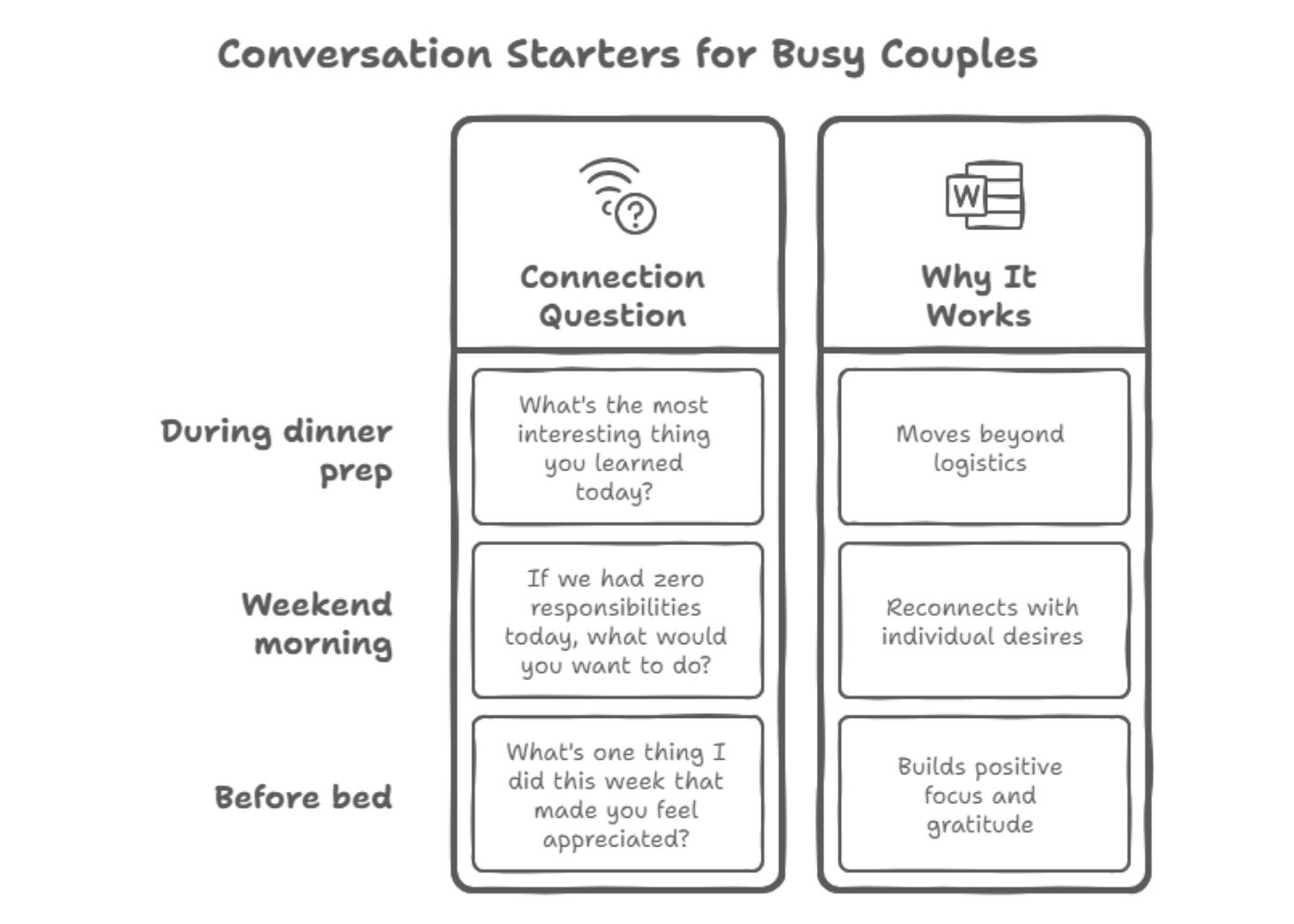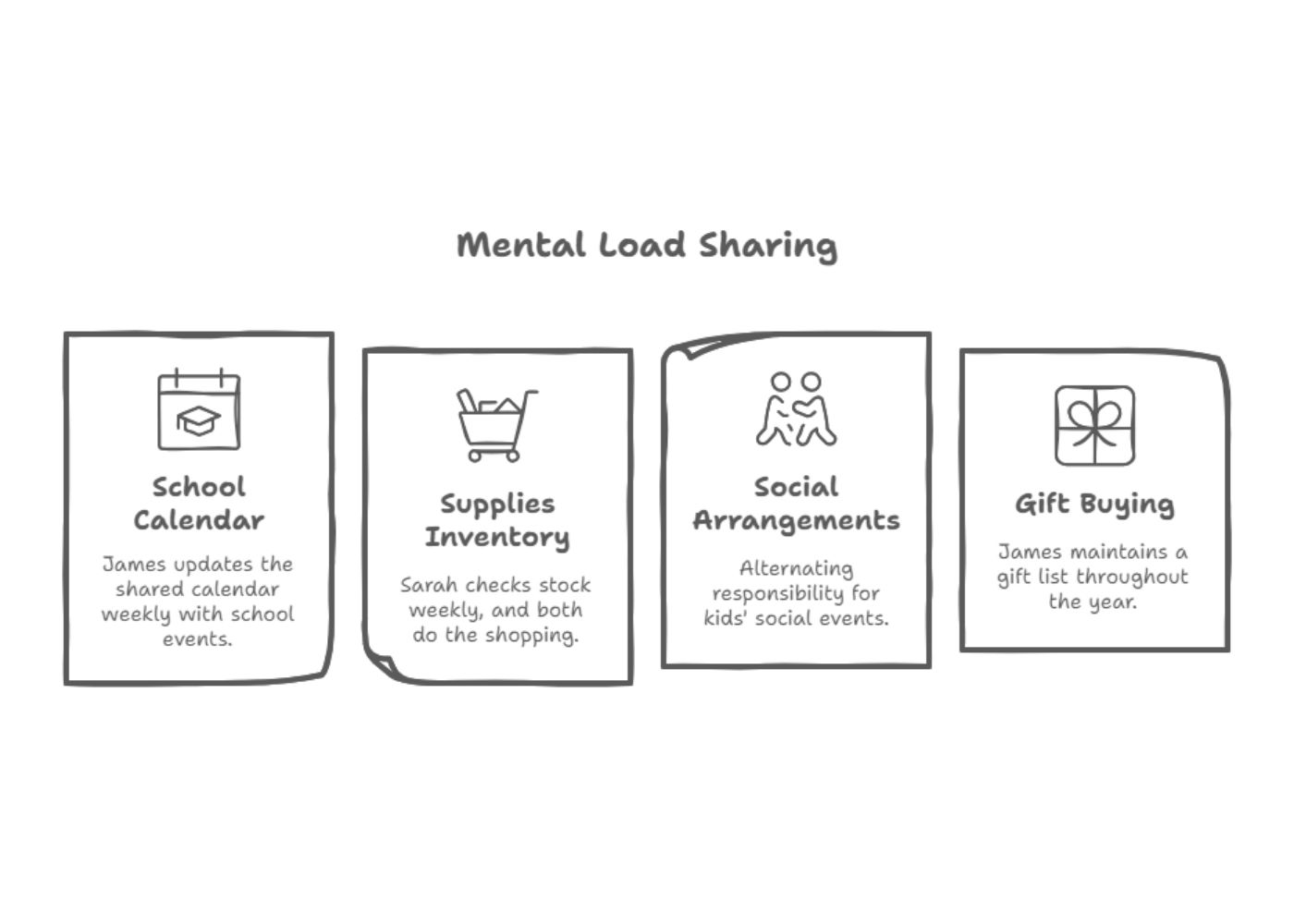
How to Reconnect With Your Partner, With Kids, Work, And 11 Tabs Always Open
How is it possible to reconnect with your partner when you’re juggling kids, deadlines, and the never-ending question of where is everyone’s other shoe?
It starts with admitting that somewhere between building your work-from-home empire and keeping tiny humans alive, you and your partner became polite strangers who occasionally sleep in the same bed.
The challenges of being a work-from-home mum are real, and your relationship often becomes another item on your endless to-do list.
If you’re feeling more like co-managers of a chaotic small business than romantic partners, you’re not alone. I’m pleased to say there are practical ways to rebuild that connection, even when your life feels like it’s running on autopilot.
Just last month, I worked with Sarah, a 34-year-old mum who runs a social media consultancy from her kitchen table while wrangling two kids under five. When she first reached out, she told me: “Sophia, my husband James and I have become polite strangers sharing a house. Our conversations revolve around school pickup times and who forgot to buy milk… Again.”
The Slow Fade: How Connection Gets Lost in the Daily Grind
When did we stop being “us” and start being “parents who occasionally sleep in the same bed”?
It happens gradually. You’re busy building your work-from-home empire, managing tiny humans, and keeping everyone fed and relatively clean. Meanwhile, your relationship quietly slides from passionate partnership to efficient roommate situation.
Research from the Australian Institute of Family Studies shows that 67% of couples report feeling disconnected after having children, with work-at-home parents facing unique challenges. You’re physically together more, but emotionally? That’s a different story.
The Real Culprits Behind Relationship Drift
Your relationship isn’t broken; it’s just buried under layers of daily survival. Here’s what’s really happening:
- Mental Load Overload: You’re carrying invisible tasks like remembering school photo day, knowing when the milk runs out, and tracking everyone’s emotional temperature. Your brain has no space left for romantic thoughts.
- The Always-On Trap: Working from home means you’re never truly “off.” James would walk into my office at 3pm to find me simultaneously answering client emails, folding washing, and mediating a sibling dispute over a toy car.
- Exhaustion Masquerading as Busyness: You’re not just tired, you’re running on empty. How can you emotionally reconnect when you feel like a phone on 2% battery?

How to Emotionally Reconnect When You Feel Like Strangers
The good news? Small, consistent actions create bigger changes than grand romantic gestures.
Start With the 2-2-2 Rule That Actually Works
You’ve probably heard about the 2-2-2 rule for couples, but let me give you the realistic version for work-at-home mums:
- Every 2 days: Have one 10-minute conversation that isn’t about logistics
- Every 2 weeks: Plan 30 minutes together without kids or devices
- Every 2 months: Arrange proper couple time (even if it’s just a long walk)
This isn’t about perfect date nights, it’s about consistent connection habits that fit your actual life.
When Sarah first tried this approach after feeling like she and James only talked about whose turn it was to deal with the school lunch orders, the change was gradual but noticeable. “We started having coffee together for 10 minutes before the kids woke up,” she told me during our follow-up session. “At first it felt forced, but within two weeks we were actually excited about those moments.”
The Art of Micro-Moments
Connection doesn’t require hours, it requires intention.
Some of my favourite relationship psychology research, comes from Dr. John Gottman, who found that successful couples create connection through tiny moments throughout the day. For busy mums, this is gold.
Try these micro-moments:
- Text appreciation, not just logistics: “Thanks for dealing with the dishwasher drama this morning” instead of “Pick up bread”
- Physical touch without agenda: A hand on the shoulder while they’re making breakfast
- Share one thing that isn’t kid-related: “I had this weird thought about work today…”
Questions That Rekindle Curiosity About Each Other
When you’ve been together for years and your conversations revolve around who’s picking up sports equipment, you need to rediscover who your partner is beyond “co-parent and household manager.”
Instead of asking “How was your day?” try:
- “What made you smile today?”
- “What’s something you’re excited about right now?”
- “If you could change one thing about this week, what would it be?”
These questions bypass the automatic “fine, busy, tired” responses and actually invite real conversation.

How to Reconnect After a Fight (Without the Kids Watching)
Fighting with your partner while working from home is practically inevitable, but repairing connection afterwards is crucial.
When Sarah and James had a spectacular argument about screen time limits while both kids watched from the couch, she felt awful, he felt defensive, and their 4-year-old asked if Daddy was going to live somewhere else now. This became a turning point in our work together.
Here’s what I recommend for post-fight repair:
The 24-Hour Rule for Busy Parents
Don’t try to resolve everything immediately. When you’re both triggered and kids are around, damage control comes first.
- Immediate pause: “We’re both upset. Let’s talk about this properly later.”
- Comfort the kids: “Mummy and Daddy are working through a disagreement. We’re both okay, and we love each other and you.”
- Self-care first: Take 20 minutes to calm down before attempting repair.
The Repair Conversation Formula
When you do reconnect, follow this structure:
“I felt [emotion] when [specific event]. What I need is [specific request]. How did you experience that situation?”
This avoids blame while expressing your needs clearly. When Sarah and James used this formula during our next session, she said it was the first time in months they actually heard each other instead of just defending their positions.
Reconnecting After Kids: Why Everything Changes (And That’s Okay)
Having children doesn’t ruin relationships, but it definitely transforms them.
If you’re trying to get back to exactly how things were before kids, you’re setting yourself up for frustration. The goal isn’t to return to your pre-parent relationship; it’s to build a new kind of connection that works with your current reality.
Working With Your New Normal, Not Against It
Dr. Sue Johnson, creator of Emotionally Focused Therapy, explains that couples need to create new rituals of connection that fit their evolved life structure.
For work-at-home mums, this might look like:
- Coffee dates during naptime instead of dinner dates
- Walking meetings where you catch up while kids ride bikes
- Sharing the mental load instead of one person carrying it all
Making Your Partner Feel Appreciated (Even When They Leave Dishes in the Sink)
The fastest way to reconnect is to notice what your partner does right, not what they’re doing wrong.
I encouraged Sarah to start keeping a mental list of things James did that made her day easier. Instead of focusing on the socks he left on the bathroom floor, she began noticing when he got up with their early riser so she could sleep an extra hour.
Simple appreciation that costs nothing but creates connection:
- “I noticed you handled bedtime so calmly tonight”
- “Thank you for picking up groceries without me asking”
- “I love how patient you were with the kids’ meltdown earlier”
This isn’t about lowering standards, it’s about building positive momentum instead of living in criticism mode.
It is so easy to see the red flags, but if you take the time also to notice the green flags this will help your frame of mind and your relationship.

Can You Fix a Relationship That Feels Broken?
Most relationship “breaks” are actually communication gaps and unmet needs, not fundamental incompatibility.
If you’re wondering whether your relationship can recover from feeling like roommates, the answer is usually yes; if both people are willing to do the work.
For additional psychology-backed relationship advice on repairing deeper relationship issues, exploring evidence-based strategies can provide valuable insights.
According to Australian relationship counsellors, the couples who successfully reconnect after difficult periods share three key traits:
- They’re honest about what’s not working without making it personal attacks
- They’re willing to try new approaches instead of repeating old patterns
- They focus on building connection rather than just solving problems
When to Seek Professional Help
If you’ve tried reconnecting strategies for 2-3 months without improvement, it’s time for external support.
Sometimes you need a neutral person to help you see patterns you can’t notice from inside the relationship. There’s no shame in getting help – think of it as relationship maintenance, like servicing your car.
Psychology Today is an amazing resource that can match you with professional help.

Practical Connection Strategies for Real Life
Here’s your toolkit for rebuilding connection while managing kids, work, and everything else.
The Weekly Check-In That Takes 15 Minutes
Every Sunday during quiet time, Sarah and James now do a quick relationship check-in that I recommended. It sounds formal, but it’s actually prevented more arguments than any other single change we implemented.
Our simple format:
- What went well with us this week?
- What felt challenging?
- What’s one thing we want to focus on next week?
This isn’t about solving every problem, it’s about staying aware of your relationship temperature.
Creating Connection Rituals That Stick
The key to lasting change is building habits that fit your actual life, not your fantasy life.
Instead of planning elaborate date nights that never happen, Sarah and James created micro-rituals that I suggested:
- 5 minutes of phone-free conversation after kids are in bed
- A quick hug and check-in when Sarah finishes work each day
- Weekend morning coffee before anyone else wakes up
These tiny rituals became the foundation for bigger connection moments in their relationship. If you’re struggling with managing work-from-home stress while maintaining relationships, you’re not alone – these small changes can make a significant difference.
Managing the Mental Load Together
One of the biggest relationship stressors for work-at-home mums is feeling like you’re managing everything alone.
Working with Sarah, I helped her create a shared note on their phones listing all the invisible tasks: remembering to book dentist appointments, knowing when they’re low on school supplies, tracking social commitments.
Now these tasks have James’s name next to half of them. As Sarah told me recently, “The mental load doesn’t feel so overwhelming when it’s actually shared.”

Your Connection Action Plan
Ready to reconnect? Start with these three steps this week:
Week 1: Foundation Building
- Choose one micro-moment ritual and commit to it daily
- Have one 10-minute conversation that isn’t about logistics
- Express appreciation for something specific your partner did
Week 2: Deeper Connection
- Try the weekly check-in format
- Ask one of the conversation questions from this article
- Spend 30 minutes together without devices or kids
Week 3: Building Momentum
- Share one mental load task with your partner
- Plan something to look forward to together (even if it’s small)
- Practice repair after your next disagreement
Small Steps = Big Changes to Reconnect With Your Partner
You don’t need to revolutionise your relationship overnight, you just need to start paying attention to it again.
Connection isn’t about finding more hours in your day or becoming a different person. It’s about bringing intention to the relationship you already have.
Sarah and James didn’t transform into a movie-perfect couple after our work together. They’re still tired work-at-home parents who sometimes argue about whose turn it is to deal with the washing machine making weird noises. But as Sarah recently told me, “We feel like partners again, not just people sharing a house and raising kids together.”
Your relationship deserves the same energy you put into your business and your children. Start with one small change this week. You might be surprised how quickly “small” adds up to “significant.”
What’s one thing you could do today to reconnect with your partner? Pick something simple, and start there.
Remember: You’re not just building a stronger relationship – you’re modelling healthy partnership for your children and creating the foundation for your family’s emotional wellbeing.

Sophia Grant is a relationship psychologist and high-value dating expert who helps mature daters and couples create emotionally fulfilling partnerships. A PhD candidate in Relationship Psychology and certified in relationship dynamics, Sophia provides psychology-backed, no-judgment advice for navigating connection challenges. Featured in relationship summits and lifestyle publications, she empowers individuals to set boundaries, elevate standards, and build love that lasts.



